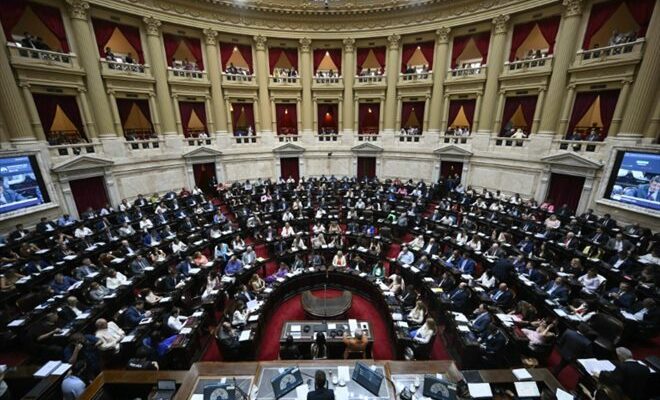Police officers stand guard in front of the Argentine parliament during debates on President Javier Milei’s reforms on January 31, 2024 in Buenos Aires (AFP/Luis ROBAYO)
The test of the street, then of elected officials: the Argentine Parliament will continue on Thursday the deregulatory reforms of ultraliberal President Javier Milei, a project already strongly amended by an executive forced into parliamentary compromises and dedicated to a debate lasting several days.
After twelve hours of debate, the Chamber of Deputies suspended the day before the lively discussions on this text, which is both voluminous and controversial. A marathon session is planned over several days, with nearly 200 speakers.
“The project is controversial but only for those who want to maintain their privileges,” assured José Luis Espert, one of the deputies of the presidential party, La Libertad Avanza, which constitutes only the third force in Parliament.
Outside, a few thousand opponents of the reforms demonstrated on Wednesday, at the call of social movements and the radical left. At the end of the day, some clashes opposed some of the demonstrators to the police, who cleared the roads near the parliament and used tear gas, AFP noted.

Clashes between police and demonstrators during debates in parliament on President Javier Milei’s reforms on January 31, 2024 in Buenos Aires (AFP/Luis ROBAYO)
Mobilization, however, is incommensurate with the general strike and demonstrations in several cities on January 24, a month and a half after Milei’s inauguration.
The package of reforms affected almost all areas, from the electoral system to education, from culture to privatizations, to the criminal code, commercial, self-defense, firefighting, divorce, the status of football clubs . After weeks of negotiations, it was cut in half, including a series of crucial tax reforms and the controversial modification of pension indexation.
– What superpowers? –

The Argentine parliament began examining the ambitious package of deregulatory reforms of ultraliberal President Javier Milei, on January 31, 2024, in Buenos Aires (AFP/Luis ROBAYO)
There remain points of contention: privatizations – the oil giant YPF has been excluded but 40 companies remain targeted -, and the temporary delegation of increased powers to the executive in the name of “economic emergency” and social.
The deputies were initially expected, probably on Thursday, to carry out a so-called “general” vote, on the principle of the law, before examining the articles in detail.
The scenario remains uncertain: deputies from the centrist opposition are ready to give “opportunities to govern” to the executive, but remain reluctant on the delegation of powers, its duration, its extension. For Martin Tetaz, “a third of the project will have difficulty being approved” as it stands and its block will require modifications.
In the left opposition, MP Hugo Yasky urged the House not to vote on the delegation of powers, “a blank check to an admirer of Vox, Bolsonaro, Trump and the entire extreme right in the world”.
“Today, politics has the opportunity to begin to repair the damage it has caused to the Argentine people,” President Milei said on the social network X.
– stagflation –

Clashes between police and demonstrators during debates in parliament on President Javier Milei’s reforms on January 31, 2024 in Buenos Aires (AFP/Luis ROBAYO)
Milei, a 53-year-old economist who defines himself as an “anarcho-capitalist”, has shaken up Argentine politics in two years of rapid rise – deputy in 2021 then president in November 2023 – with a program of deregulation and “cutting” of an “enemy state” and expensive.
“There is no plan B” for budgetary austerity, he insisted again in recent days, to stabilize an economy in debt and strangled by chronic inflation, at 211% for the year 2023.
In fact, its strongest measures to date are already affecting the daily lives of millions of Argentines: a devaluation of more than 50% of the peso in December, “liberated” prices – which the previous government tried to regulate as best it could. badly – and the end of subsidies for transport, energy in particular.
First concrete impact: record monthly inflation of 25% in December. Mr Milei himself warned that things were “going to get worse” initially, with “stagflation” (stagnation of activity combined with high inflation) in 2024.

Clashes between police and demonstrators during debates in parliament on President Javier Milei’s reforms on January 31, 2024 in Buenos Aires (AFP/Luis ROBAYO)
The director of the International Monetary Fund (IMF), Kristalina Georgieva, said on Wednesday that the government was taking “bold steps to restore macroeconomic stability and begin to tackle obstacles to growth.”
The IMF, which anticipated 2.8% growth in Argentina in 2024, has however revised its forecasts and projects a recession, -2.8%, in Latin America’s 3rd economy, under the effect of austerity measures. The country would thus be the only one in the G20 in recession in 2024, before a recovery of +5% in 2025, according to the Fund.
© 2024 AFP
Did you like this article ? Share it with your friends using the buttons below.




